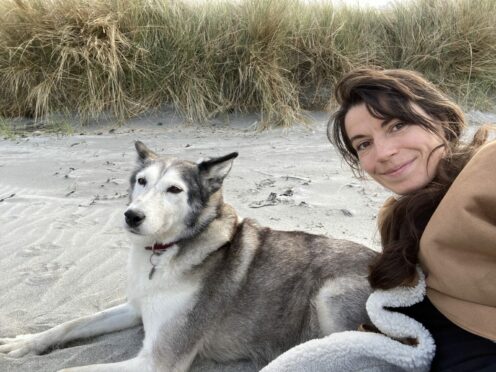
Desperate for adventure, author Cal Flyn quit her media job to work in the Arctic Circle where she bonded with a special husky called Suka.
Seven years later, she would welcome the retired sled dog to her new home in Orkney and here, in a chapter from a new book, she tries to explain their very special relationship.
When I met Suka for the first time, she was working as a sled dog in the north of Finland. I was working there too. It was a hard, physical lifestyle, but it had its consolations.
The dogs began to howl for their breakfast at four or five in the morning, as we lugged heavy sledges laden with meat through the dark. I didn’t see daylight for more than a month but the sky was a shifting wall of technicolour: a pink and purple dawn teasing the sky for hours, never quite spilling into sunrise. Blood-red noons. The moon hung heavy in the sky, burnt orange, and at night, the stars blazed with a fierce intensity. The aurora in veils of green and gold.
This was the winter of 2012. I’d taken the kennels job as an escape route from a life in the city that had been making me sick. What had begun as urban ennui had metastasised into a more malignant form of depression, one I had never experienced before. By the time I left London for the Arctic, I’d had the uncanny sensation of watching my life unfold as if through glass for a period of six months or more.
I’d known instinctively that the harshness of an Arctic climate and a challenging manual job would serve as a sort of shock therapy for my brain: that through corporeal trial I might reunite body and mind, force them to work in concert once more. So there I was, in Finland. As a career move, I wouldn’t recommend it. But the thing is: it worked. My soft hands coarsened – I grew callouses on my palms and my numb fingertips were peeling. My sinews tightened, my clavicles sharpened. I felt more fully alive than I had in years.
To begin with, the dogs were an anonymous canine horde with deep barks and flashing eyes. But soon I saw them for who they really were: good-natured familiars, with names and personalities. Monty, the old boy with only half a tongue – an injury from licking ice-cold metal as a pup. Pikkis, with his big black eyes and phocine face. Little Rosie, who would jump from the roof of her kennel into your outstretched arms. And Suka.
Suka was my favourite dog: a docile, heart-faced creature who closed her eyes in ecstasy when you rubbed her rump. Small in stature and not too strong, she might not have been a valuable sled dog had she not been the only female dog submissive enough to run with Hulda – an athletic, pointy-eared bitch – without getting into fights.
Designing dog teams is a feat of matchmaking: the dogs run in pairs, sorted for strength and intelligence. Everyone has to get along with their partners. As long as Hulda was running, Suka had an important role: official wing-woman to the top female lead dog. I liked to watch them together on the start line: Hulda snapping and yowling, cavorting like a demon in her harness, ready to run. Suka beside her, ears perked, waiting, sweet-natured. When she was allowed in at night, I would bribe her to sleep on my bed, curled up tight like a cat. Where the other dogs were bouncy or rambunctious, she was watchful and reserved. She was, in other words, a perfect companion. Whether she felt the same about me was more difficult to tell.
Seven years later, I am deep in concentration on a writing residency in Switzerland when I get an unexpected call from Finland. Suka is nearly 11, ready to retire. She’s slowing down, getting stiff, holding up the team. Might I give her a home? I don’t hesitate.
A former colleague brings Suka overland to the UK for me. I meet them in a cafe, buy her breakfast, then it’s just me and my dog. She is smaller than I remembered, and – mid-moult – has a dishevelled, bewildered air. Having barely left home for her entire life, she has travelled through five countries in as many days. My presence seems barely to register; she lets me pat her but refuses to meet my eye.
I drive us home, to where my partner Rich is waiting. We show Suka her new bed, her new bowls, her new collar. We take her for a sniff around the town. People want to know: did she recognise you? I say it’s difficult to tell.
It’s difficult to tell a lot of things. Suka is quiet and respectful. She gets up when I ask her to. Sits when I tell her to. She’ll take a treat gently from my hand but she won’t always eat it. The closest I can find is that it’s like hosting a foreign exchange student; she is scrupulously, unfailingly polite. But I have the very faintest impression she might be saving up slights to tell her friends about later.
On our first walks, she finds a cold welcome from the local dogs. Something in her gait, her manner – her smell, perhaps – seems to get their backs up. She assumes a dignified bearing, declines to engage. When, finally, a friendly pup approaches, almost frantic to meet her, Suka doesn’t seem to know how to react. Out of a hundred huskies she might have been the softest of them all but here amid the Labradors and spaniels she seems proud and stand-offish.
In the house, I don’t quite know how to place her. She does not follow me around, as other dogs will. She has her own agenda. She does not beg at the table. She does not bark. She does not come when she is called.
Her body language is peculiar too. She will wag her tail but the exact meaning is difficult to parse: rather than the uncomplicated happiness of a pet dog getting its cuddles, it signals a more ambiguous kind of anticipation. Praise or attention might merit a slow pendulum swing but the approach of an aggressive dog or a visit to the vet occasionally elicits a fulsome swish of the kind I might once have hoped for on arriving home after a long day.
She is entirely benevolent, except when she’s not. She has no interest in fighting. She is entirely neutral on the subject of cats. But early one morning, in the dancing light of a sun cast low through bare branches, a sparrow darts from a tumbledown wall and her jaws snap shut. It leaves this world as fast as it appeared. She swallows it whole. This makes me look at her afresh: this dog knows what she’s doing. It’s not that I’m unnerved, or not exactly. She’s still the calm and passive creature I fell in love with. But I begin to see her in new light. There’s the faintest thread of menace running through her, an undercurrent of cool self-interest. As it must, of course, in every dog – no matter how small, how cute, how apparently frivolous. It’s just that, in Suka, the wolf runs closer to the surface than I’d known.
Less than a month after her arrival, Suka falls deathly ill. It’s an acute uterine infection, of an urgency and seriousness equivalent to appendicitis in humans. One evening she seems a bit peaky; the next morning she can barely stand. We rush her into emergency surgery and, by the time she returns to us, days later, she is glassy-eyed and missing her womb. She has stitches in her belly.
For the first few nights after her return, I sleep with her on the kitchen floor. By the third or fourth, she sleeps with me on my mat, curled into the recess between my legs and belly, not quite touching me but close. I feel ill with relief. Sickeningly, painfully grateful. And more: it feels like something has shifted between us. She knows who I am to her now, if not who I was before. There is warmth, where before there was only tolerance. But, as she recovers, something else is changing too: a kind of reshuffling is under way, our positions in the social hierarchy are evolving. In Finland, I was her boss and I treated her – and her kennel mates – accordingly. I ordered them to step back as I opened the door. I caught them quickly, even roughly. Harnessed them. Brooked no objections. There were strict boundaries and she respected them. They all did. Now, in our shared house, the balance has shifted. We are all adults here, cohabiting. Negotiating.
It no longer feels reasonable to force my will on her. She’s retired; I’m a self-employed writer. There is no hard schedule to adhere to. It seems important that our life together is based on mutual consent. If she’s hungry, I feed her. If she’s restless, I walk her. She doesn’t ask for much, I say to Rich. And it’s true. But the truth is, I would give anything to please her. Anything at all.
Her presence reveals certain weaknesses in my character I haven’t previously confronted. I find myself desperate for her approval, flushing with jealousy if she shows even the faintest preference for certain friends or neighbours. In the face of her nonchalance, I am needier than I have ever been in love. I clamour for her attentions, debase myself for her affection daily. When she’s fired up, I’ll get down on all fours to prance with her. When she howls to the sky, I will howl in answer. I have lost all self-consciousness in pursuit of her approval. What can I do to make her love me the way that I love her?
I pore over guides to canine behaviour, in search of a self-help philosophy. I read somewhere that for a dog to respect you, one should train them, have them do your bidding. Suka knows how to sit and lie down on command, and she will – but when she obeys, I feel she does so with a sense of irony. I teach her to “stay”, and to offer her paw. She considers my requests sceptically, and more often declines. In exchange, I offer titbits, but she does not always take them. She is not, as they say, “food-motivated”. Nor is she stirred by praise. She would not be so basic. Suka is powered by some internal fire that burns untended by you or me.
In fact, food soon becomes our greatest source of anxiety. She never quite regains her appetite after her illness. She picks over her food, turns her nose up at the rest. She loses weight, becomes rangy and ragged. Panicked, I take up a new role as kitchen maid, cooking scrambled eggs at a few hours’ interval. I shred chicken breasts into bone broth. Grate parmesan over raw beef. I follow her from room to room offering dainty morsels served straight from my fingertips.
I am not unaware of my descent. Occasionally I voice faint misgivings to the vet: might we have passed from the pathological into preciousness? Am I creating a monster? The verdict is always the same: perhaps, yes. But they point to her freefalling weight, her erratic health. What’s more important? My pride, my dignity? Or keeping her alive?
I’m keeping her alive. God willing, she will turn 14 this year. In return, I accept my fallen status. With time, our roles have solidified. She has adopted the regal air of an ageing monarch whose body is slowly failing her. I am her devoted hand maiden, bowing and scraping. When she walks, we move down the street in stately, slow-moving cavalcade, stopping when she wants to stop – to read messages on a nearby lamp post, perhaps, or to greet her loyal subjects – and turning back when she tires of the whole production.
When she first arrived, I expected her to soften, to relax into the character of the panting lapdog. To prostrate herself on rugs, upturn her belly for rubs. And though it’s true that as she grows older, she deigns more often than ever to express her favour – leaning into me while I rub her neck, tucking her head under my arm, table scraps of understated affection just enough to keep me going – she has in many ways grown harder, more private, ever more imperial in response to my endless adulation.
Author: Islanders may go away but don’t want to stay away. There is so much love for the place
Suka’s strength fluctuates, but the trend is downhill. We slalom with her. Such is the agony of dog ownership: the way our timers draw down in asynchrony. It’s hard to accept her sand might be running out. Despite her self-possession, Suka – born in a kennel to run in a team – doesn’t really like to be alone. I can’t bear to think of her taking that last walk through the dark without me.
When she is feeling ill, there is one fail-safe trick to lift her from her starvation diet. A little fresh blood, drunk straight from the bowl, or drizzled over rice, or frozen into cubes. When I pour it out, I see awareness pass through her. Her nostrils will flare, her muzzle will lift. I see a tightening around the eyes, as the room comes into focus. A flicker of the wolf that lives inside her still.
Not yet. Each day we fend off death, one morsel at a time. It’s blood she wants. It’s blood she needs. But it is me who, now she is old and tired, walks down to the butcher and begs for it.
Dog Hearted: Essays On Our Fierce And Familiar Companions is out in paperback on Thursday published by Daunt Books.

Enjoy the convenience of having The Sunday Post delivered as a digital ePaper straight to your smartphone, tablet or computer.
Subscribe for only £5.49 a month and enjoy all the benefits of the printed paper as a digital replica.
Subscribe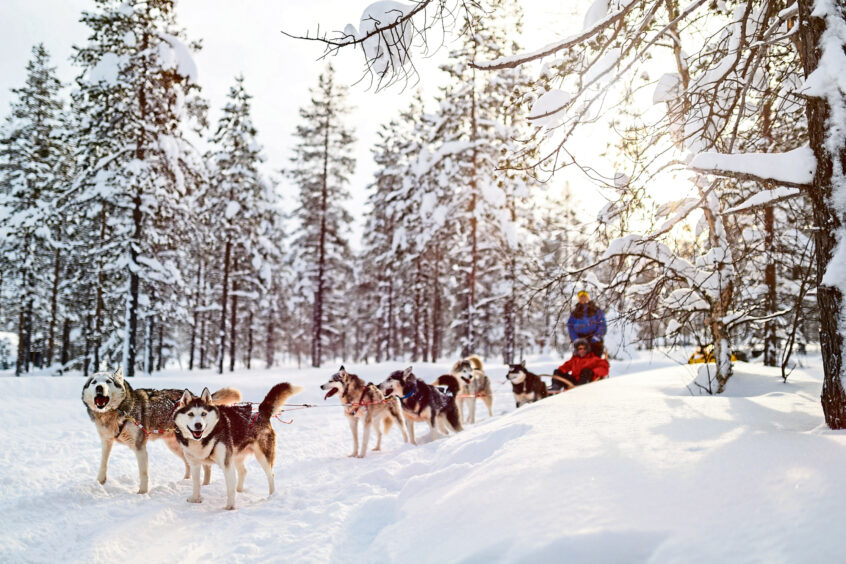 © Shutterstock / BlueOrange Studio
© Shutterstock / BlueOrange Studio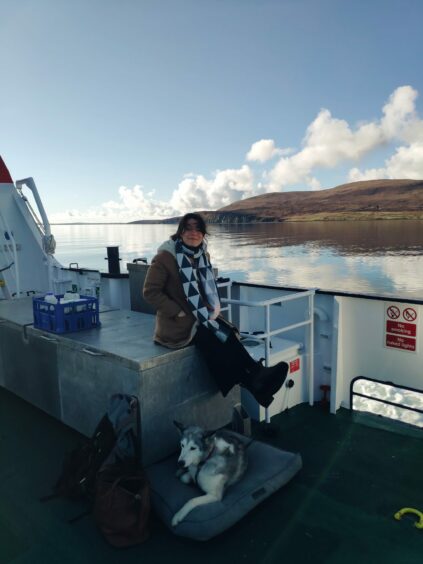
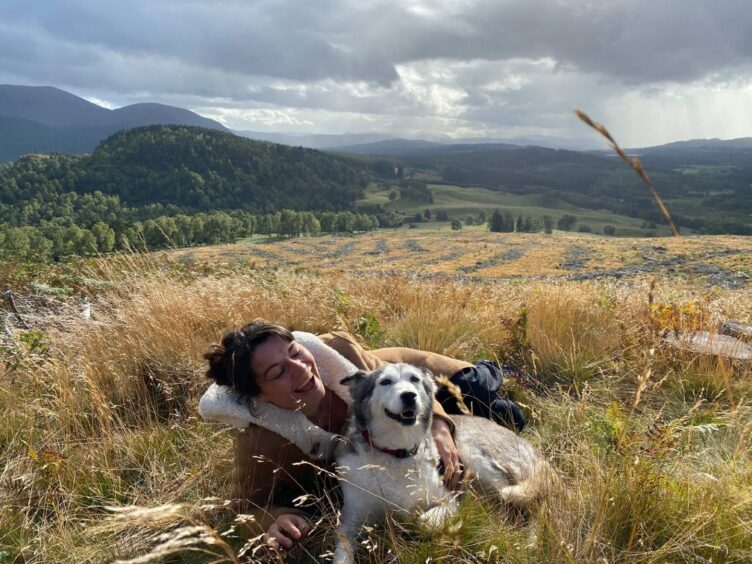
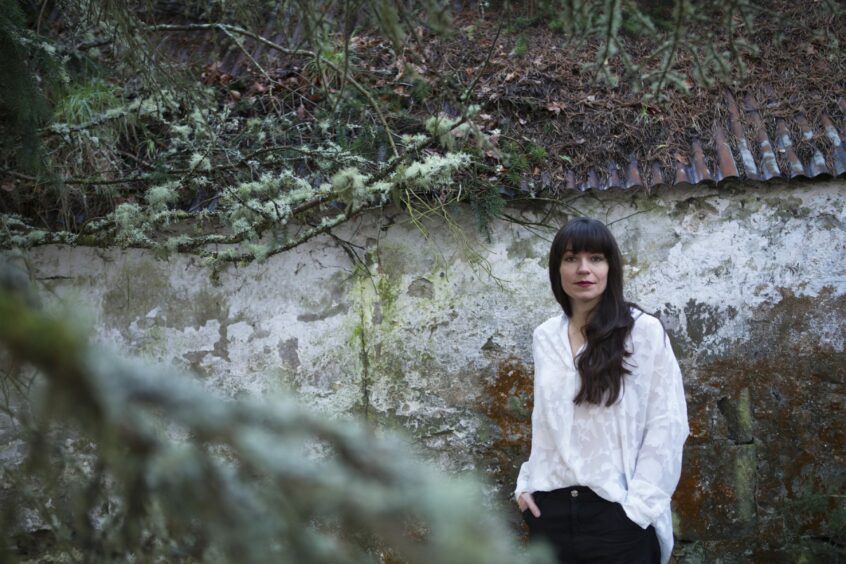 © Nancy MacDonald
© Nancy MacDonald